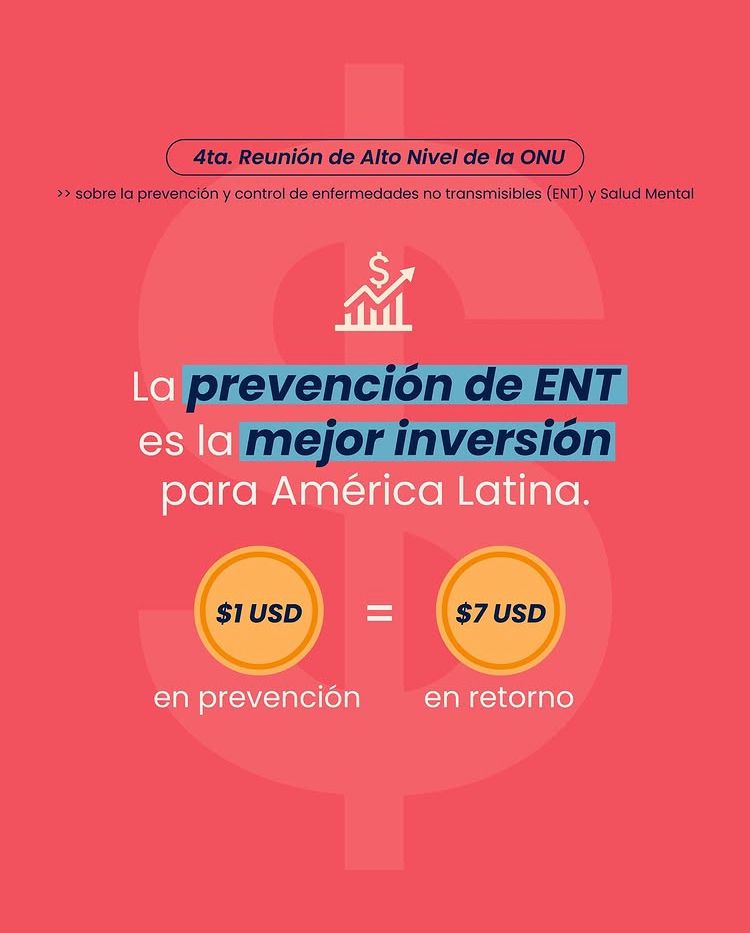Agustina Luque (Colansa and CLAS)
- Almost all Latin American countries expressed their support for the declaration, and during their speeches highlighted the need to promote public policies to reduce the prevalence of non-communicable diseases (NCDs).
- In the speeches, reference was made to the need to promote public policies such as health taxes, in order to curb non-communicable diseases.
- The declaration sets global targets to be achieved by 2030.
During the 4th High-Level Meeting on Non-Communicable Diseases (NCDs) and Mental Health, held on September 25, 2025, at the United Nations, representatives from various countries expressed their support for the Political declaration of the fourth high-level meeting of the General Assembly on the prevention and control of noncommunicable diseases and the promotion of mental health and well-being.
The meeting was attended by Heads of State and Government as well as ministers of health from all United Nations member states. With regard to the Latin American region, representatives from Costa Rica, Peru, Colombia, Ecuador, Panama, Mexico, Brazil, and Uruguay expressed their support for the declaration and, during their speeches, stressed the need to promote public policies to reduce the prevalence of noncommunicable diseases.
NCDs, including cardiovascular and pulmonary diseases, cancer, and diabetes, are the leading causes of death worldwide, claiming at least 43 million lives in 2021, including 18 million people under the age of 70. Four out of five (82%) of these premature deaths occur in low- and middle-income countries. Meanwhile, mental health conditions affect more than one billion people worldwide.
In this regard, Uruguay’s Minister of Health, Cristina Lustemberg, stated that the prevention of noncommunicable diseases is a national priority, underscoring the influence of commercial, social, and environmental determinants on health. She reaffirmed that Uruguay views health as a universal human right, a public good, and a responsibility of the State. Finally, she reiterated her commitment to quality care, obesity prevention, and alcohol and tobacco control. For his part, Mexico’s Undersecretary of Health, Ramiro López Elizalde, warned about the mortality burden associated with the consumption of sugary drinks and lamented that traditional cuisine has been displaced by poor-quality products. He emphasized the effectiveness of measures implemented in his country, such as front-of-pack labeling, taxes on sugary drinks, and advertising regulations. Nevertheless, he noted that there remains an historical debt, as these measures do not immediately resolve persistent inequalities. He stressed the need to adopt the political declaration because it addresses root causes, especially inequality. “Addressing health is an act of humanity, not a technical issue,” he concluded.
In the case of Colombia, Jaime Urrego Rodríguez, Deputy Minister of Public Health, made specific requests: he invited countries to adopt the declaration and to implement gender equity in all health policies.
During the speeches of the Member States, the need was highlighted to promote public policies to halt noncommunicable diseases, such as health taxes: taxes on sugary drinks, tobacco, alcohol, and ultra-processed products. Other measures discussed included regulating aggressive marketing by industry, regulating product labeling and packaging, stopping interference from commercial determinants, and promoting the participation of civil society free of conflicts of interest in partnership with governments to improve health in the Americas.
The political declaration under discussion is entitled “Equity and integration: transforming lives and livelihoods through leadership and action on noncommunicable diseases and the promotion of mental health and well-being”, and it was submitted to the General Assembly for approval.
The declaration sets global targets to be achieved by 2030, namely: 150 million fewer tobacco users; 150 million more people with controlled hypertension; 150 million more people with access to mental health care.

